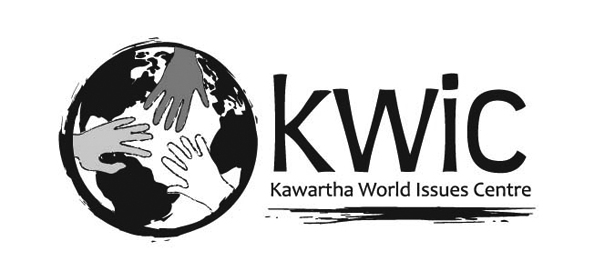
The Kawartha World Issues Centre (KWIC) is a registered non-profit, “grassroots and charitable Global Education and Resource Centre which promotes dialogue and understanding of world issues to enable people to engage in positive social and environmental change,” as stated on their website. KWIC was officially launched in 1989, after more than five years of persistent and dedicated efforts by a passionate group of Trent and community members.
KWIC invites students to understand and make change on important issues at the local and global levels, such as Indigenous rights, climate change, democracy, mining, human rights and poverty, through three key program areas: multi-generational Community Education Programs, Youth and In-School Programs, and by supporting new and growing projects – like TRACKS Youth initiated several years ago by Trent Indigenous Environmental Science and Studies (IESS) and supported by the First Peoples House of Learning (FPHL).
Since the beginning KWIC has truly been a grassroots collaborative project – both the International Development Education Project (IDEP) and Peterborough’s chapter of Oxfam’s Action for Africa Project requested that their funding be diverted into KWIC, agreeing to cease operations in order to support the launch of KWIC instead. KWIC began as a “hub for social and environmental justice work,” which it continues to embody today.
Cosgrove explained that KWIC’s “broad mandate allows us to be really responsive and that’s what makes us unique.” The centre serves to connect students to global issues, local initiatives and other groups both at Trent and in the community, who are working on similar issues, Cosgrove said.
For example, Sustainable Trent and GreenUp were both formed through support from KWIC, which helped them become established as independent groups. Peterborough has a “web of interconnected organizations and initiatives, many under the umbrella of KWIC.”
KWIC operates with a small staff team and passionate volunteers who support everything from governance on the Board of Directors to office support to programming. Cosgrove mentioned the importance of youth leadership opportunities throughout the organization, a core value of KWIC, which provides great opportunities for students.
“KWIC has been integral to furthering my leadership skills and teaching practices. I have been able to follow my passions, work within an inclusive environment and gain skills that are directly applicable to my future career path. My time working with KWIC has been one of the most valuable and rewarding components of my post-secondary education,” stated Erin Clancy, Trent University student and TEACH Coordinator.
Fast forward 30 years, and KWIC’s community ties are stronger than ever, as the organization continues to operate in concert with numerous other organizations and initiatives. Current Executive Director Julie Cosgrove explained the relationship with their various community partners as an “interconnected web that supports each other,” in an interview, emphasizing the importance of their partnerships with other Trent groups and community organizations.
This is exemplified in the organization’s Global Education and Resource Centre on the Trent’s Symons campus, in the Environment Science building. It is a shared space open to all students for use, and this organization gives students the opportunity to pursue change in areas that matter most to them, within a like-minded and inclusive community.
KWIC’s connection to Trent University students has been integral to the organization since day one. Trent students were not only involved in establishing KWIC, but also approved their levy during the March 1987 referendum, helping to secure funds to launch KWIC in 1989. The levy fee began as $4, but has since adjusted with inflation to $5.98 per student, per academic year. This fee has always been refundable should students choose to request their money back.
The Trent student levy helps to keep KWIC up and running, contributes to KWIC supporting several student positions – including paid work, internships and placements as well as valuable volunteer opportunities each year – alongside its programming. The levy is core funding for this organization, whereas most other funding they acquire is project-specific and requires expending resources to obtain.
However, their operations and programming are dependant on funding, which is now marred by uncertainty.
The Student Choice Initiative (SCI) “has taken away a sense of stability and continuity of programming,” Cosgrove explained. Some funding goes towards facilitating experiential learning for students, which will be in flux now, and “this does a disservice to students.”
“It will also have an effect on our capacity to be able to offer programs and support to other partnership groups and initiatives,” an important aspect of KWIC’s mandate, she said.
To learn more about KWIC, or how to get involved, contact them here. Or drop by the KWIC Global Education and Resource Centre located at ESC B101, in the hall just behind the winding staircase. KWIC friends can also be found at Sadleir House in office 206.


